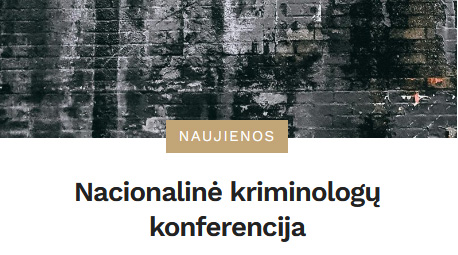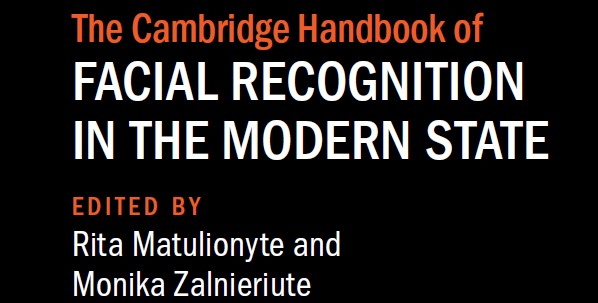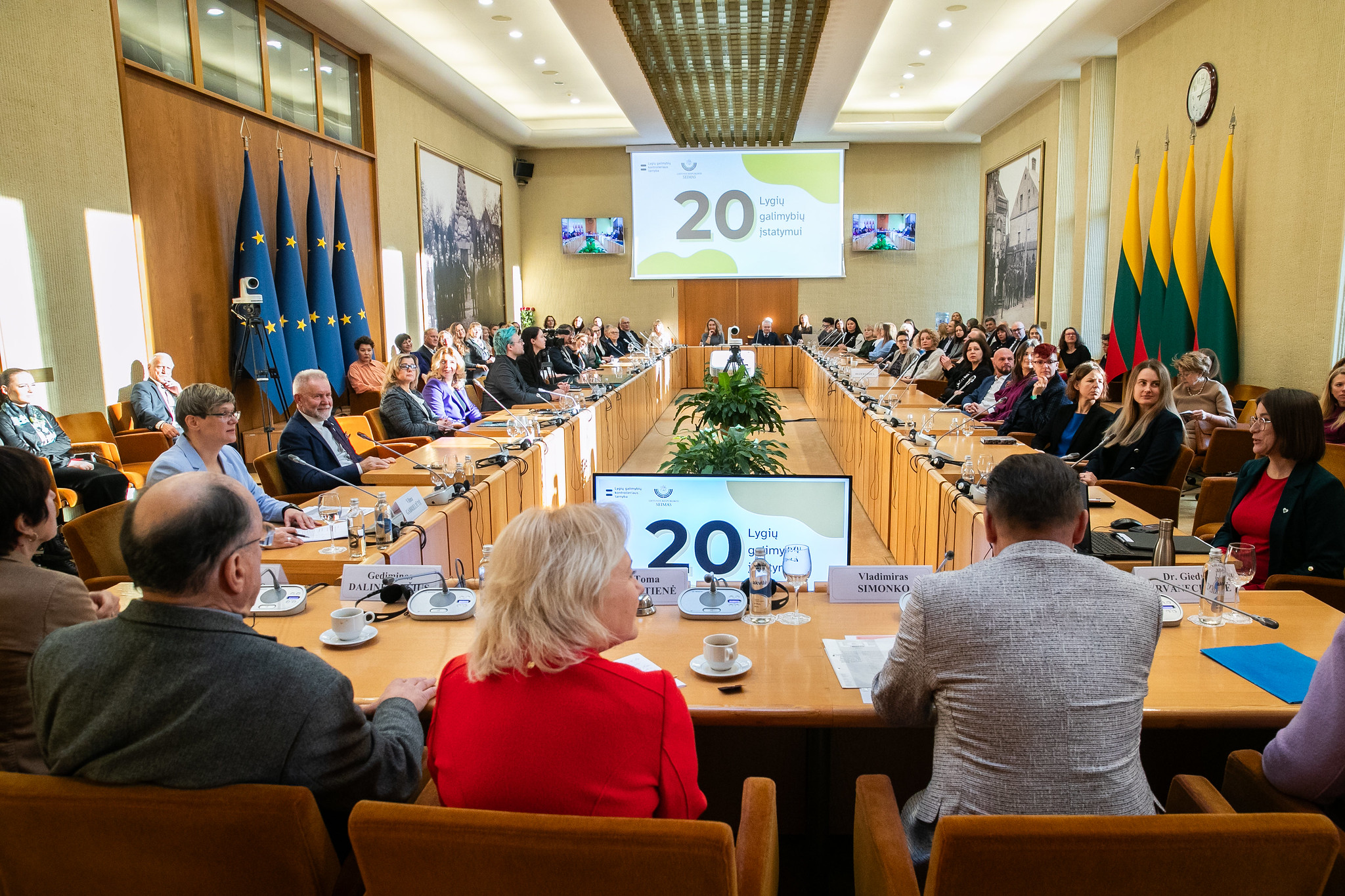
NEWS ARCHIVE
- NEWS

LCSS Institute of Law, the Lithuanian Association of Criminologists and the Faculty of Philosophy of Vilnius University invite you to the annual Lithuanian Criminologists' Conference "Contemporary Connections of Criminology: science, practice, everyday life". The conference is dedicated to discussing contemporary issues about the challenges and needs of digital technologies and innovations in the context of criminological science. The conference will focus on the role of rapid change, technology in crime control and the concept of punishment.
The scientific conference will feature presentations from a wide range of disciplines, which will delve into contemporary issues that arise in science, law enforcement and public sector institutions.
The date of the conference is Friday 19 April 2024.
Conference time: 9:00–17:00
On-site registration: 8:30 – 9:00
Participant registration form.
Conference venue - Vilnius University Science Communication and Information Centre, Saulėtekio al. 5, Vilnius.

We kindly invite you to the 4th Annual International Conference "Trends and Challenges in European and National Criminal Policy", which will be held on 12 April 2024, organised by the LCSS Institute of Law, the Faculty of Law of Vytautas Magnus University and the Law School of Mykolas Romeris University.
The conference will feature presentations by Polish and German scholars, researchers from the LCSS Institute of Law, Vytautas Magnus University Faculty of Law and Mykolas Romeris University School of Law. Practitioners and researchers will discuss various topics in the field of criminal law, present the results of the latest research and raise topical issues of criminal policy.
The date of the conference is Friday 12 April 2024.
Registration on site: 8:30 - 9:00
Conference: 9:00 - 14:10
Conference venue - Mykolas Romeris University, Ateities str. 20, Vilnius, Room 414.
Program of the event here.
Participants who have registered and attended at the conference will be able to receive a certificate of attendance.
Photo by Jaoa Cruz (Unsplash).

The internationally renowned Cambride University Press has published a collective book, coordinated by the Institute's researchers, which examines various aspects of the use of facial recognition technologies: The Cambridge Handbook of Facial Recognition in Modern State (eds. Monika Žalnieriūtė and Rita Matulionytė).
The book covers the legal, social and ethical aspects of facial recognition technologies in five regions of the world - Europe, North America, South America, Asia-Pacific and Africa.
Facial recognition technologies are widely used in institutions ranging from border control and police to social services. Automated facial recognition technologies are used by governments in various countries to collect taxes, prevent crime and control migration processes. Facial recognition technologies involve the processing of a person's facial image,usually for identification, categorisation, or counting. This book brings together contributions from experts in law, technology, communications, and social and political sciences to discuss how facial recognition technologies have been developed and used by local authorities, and how they are regulated in different jurisdictions across five continents.
The book consists of 19 chapters written by 34 contributors from around the world, including Institute of Law researchers Rita Matulionytė, Agnė Limantė, Egle Kavoliūnaitė-Ragauskienė and Monika Žalnieriūtė.
This book is the result of the project „Government Use of Facial Recognition Technologies: Legal Challenges and Solutions (Face-AI)“. The project was funded by the Lithuanian Research Council (Contract No. S-MIP-21-38).
The book is available here.

LCSS Institute of Law is changing its address and moving to new premises. From now on you can find us at A. Goštauto str. 12, Vilnius!

Dr Agnė Limantė, Chief Researcher at the Legal System Research Department of the Law Institute of the LCSS, became a member of the International Advisory Board of the scientific journal Collected Papers of the Faculty of Law of the University of Rijeka. Congratulations to our colleague!

„The international Journal of Human Rights“ has published an article by Dr. Agne Limante, a researcher at the Institute, called „Protecting vulnerable groups in Europe: highlights from recent case law of the European Court of Human Rights“.
The article focuses on recent cases of the European Court of Human Rights (ECtHR) where the Court has granted legal protection to vulnerable groups. It examines the paradigm of vulnerability in the context of the ECtHR cases and the case law in order to identify recent trends and developments in the Court's decisions.
Agnė Limantė's publication can be found here.

On 22nd of November 2023, the 20th anniversary of the adoption of the Law on Equal Opportunities was marked with a celebration. During the event for the celebration, a LCSS Institute of Law researcher, Artūras Tereškinas was presented with a letter of appreciation for his important and historically significant contribution to establishment of equal opportunities in Lithuanian society.
We are happy and proud of our colleague and his significant work!
Artūras Tereškinas' work can be found here.
Photo from the Office of the Seimas.

A project submitted by the LCSS Institute of Law and Dr. Gabrielė Taminskaitė- Kočiūnė has won funding in the Research Council of Lithuania postdoctoral internship competition. Dr. Gabrielė Taminskaitė-Kočiūnė, under the supervision of Prof. Dr. Ingrida Mačernytė-Panomariovienė, will implement the research project „Work-life balance: legal measures and theri implementation“. The aim of the research is to analyse and reveal the legal instruments for ensuring work-life balance in Lithuania, their objectives, application and functioning in practice, in the context of international and European Union and national constitutional law, as well as in comparison with individual foreign examples.
Congratulations to the project leader and the trainee!
Associative unsplash photo (Andrew Neel).

LCSS Institute of Law, having implemented the project "E-training on EU Family Property Regimes" (EU-FamPro), invites you to participate in free online learning courses on private international family law.
The training is aimed at legal professionals who want to improve their knowledge in the field of private international family law and learn more about the EU regulations on property regimes for international couples.
Registration for the course (open until 14 October 2025)
Pabaiga

